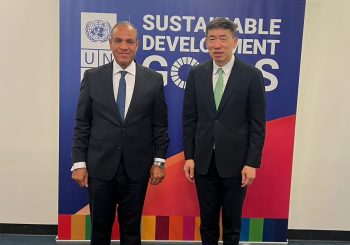For the upcoming five-year period of 2025-2029, there is a 70 percent chance that the average global warming will be more than 1.5 degrees celsius hotter than pre-industrial times, a new report by the World Meteorological Organization (WMO) finds.
The forecast is up from 47 percent chance in last year’s WMO report for the 2024-2028 period.
The 1.5 degrees celsius threshold holds symbolic significance as all governments under the Paris Agreement aim to keep global warming within that limit under the 2015 Paris Climate Agreement.
The new report also states that there is a 80 percent chance that at least one of the next five years will exceed 2024 as the warmest on record, and there is an 86 percent chance that at least one year will be more than 1.5 degrees celsius above the pre-industrial period.
Greenpeace Middle East and North Africa (MENA) sounded “the alarm” on May 26 as extreme heatwaves hit the region. Egypt and Iraq grappled with an intense increase in temperature, the United Arab Emirates shattered its May temperature record for the second consecutive day, reaching a staggering 51.6 degrees celsius in Abu Dhabi—just 0.4 degrees celsius shy of the country’s all-time high. In Kuwait, temperatures remained close to 50 degrees celsius throughout the week. Meanwhile, Morocco issued an official heatwave alert for several provinces.
“These conditions are no longer rare; they are the new normal in a region heating at nearly twice the global average. […]The conditions threaten public health, and underscore the region’s acute vulnerability to the escalating climate crisis,” said Kenzie Azmi, Regional Campaigns Lead at Greenpeace MENA, in a press release.
Average annual temperatures in Egypt have increased by 0.38 degrees celsius per decade between 2000 and 2020—higher than the global average of 0.31 degrees celsius per decade.
“Even though our region is not historically responsible for the problem, we are among those suffering the most,” Azmi stated.
Egypt is among the most vulnerable countries to the impacts of climate change, with key sectors at risk including agriculture, water resources, coastal areas, health, and infrastructure.
Extreme weather events have been on the rise, with people and their livelihoods on the line. On Saturday, an unseasonal storm struck Alexandria, triggering flash floods, widespread power outages, and major disruptions to daily life. The storm brought intense rainfall, hail, and strong winds, causing serious damage across Egypt’s coastal city.
Academic institutions were forced to halt exams, while ports were shut due to dangerous wind speeds and high waves. Emergency services responded to building collapses and severe flooding in residential areas. Authorities also declared a state of emergency as streets and infrastructure buckled under the pressure of this sudden weather turnaround.
Government leaders need “to move faster, to protect our people, communities, economies, and our future. This means investing more in existing solutions that help us adapt and speeding up the shift to renewable energy. This also means playing a leading role in holding Global North countries accountable for delivering adequate climate finance to the Global South at international climate talks,” she said.
The WMO report comes a few days ahead of the Bonn Climate Talks, where countries advance discussions on climate change issues at a technical level, laying the groundwork for political decisions at the annual Conference of the Parties (COP). COP30 is set to take place in Belem, Brazil in November.






Comments (0)